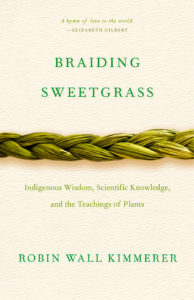 Braiding Sweetgrass
Braiding Sweetgrass
By Robin Wall Kimmerer
Milkweed Editions: 2015
In Braiding Sweetgrass: Indigenous Wisdom, Scientific Knowledge, and the Teachings of Plants, author Robin Wall Kimmerer asks readers to “imagine raising children in a culture where gratitude is the first priority.” This is the gist of Kimmerer’s stunning book, where she discusses our relationship to the natural world through the lens of plant ecology and Indigenous knowledge.
Kimmerer, a member of the Citizen Potowatomi Nation and a professor of environmental biology, astutely observes that we do not live in a society that teaches gratitude towards each other or the natural world. She contrasts that with the teachings of Indigenous peoples, illustrated through the words of the “Thanksgiving Address” of the Onondaga Nation that is recited every week by schoolchildren in their ancestral language. In this address, the children give thanks to the natural world, their ancestors, their families, and their spirituality. They are told to begin each day with gratitude, before their feet even touch the earth.
One particular thanksgiving is to the plants of the “three sisters”: corn, beans, and squash. These foods have a special significance and grow in a way that creates symbiosis. The corn grows tall and straight while the beans wind their way up the stalks. The squash takes shade below and provides water for all three. Kimmerer wonders what we would be like if we lived in a culture of interdependence like this, having a give-and-take with nature.
The first colonists coming to Massachusetts 400 years ago, Kimmerer explains, saw the crops tangled rather than laid out in rows. They assumed that the Indigenous people could not farm. This did not, however, stop the colonists from taking the crops.
This book proposes that our gratitude could help heal this transgression. First by acknowledging it. Then by restoring native plants to the ground. And finally by understanding that human beings are not supreme among beings. Just one part of the larger world.
I also chose this book because Kimmerer discusses family rituals and ceremonies. Growing up, hers were small. Her father drained coffee grounds downhill until they met the river while he praised the gods, a thanksgiving for the day. Ceremony, she reminds us, is a vehicle for belonging — to a family, to a people, and to the land.
Although this book was published in 2015, there is a long wait list for it at the library. I am hopeful that people are eager to learn about living in a world of gratitude, that people want to give thanks.
Jennifer Wertkin is director of the Wellfleet Public Library.



